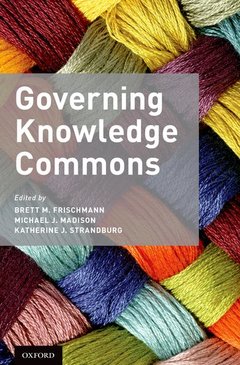Description
Governing Knowledge Commons
Coordinators: Frischmann Brett M., Madison Michael J., Strandburg Katherine J.
Language: English
Subject for Governing Knowledge Commons:
Publication date: 09-2014
520 p. · 23.1x15.5 cm · Paperback
520 p. · 23.1x15.5 cm · Paperback
Description
/li>Biography
/li>
"Knowledge commons" describes the institutionalized community governance of the sharing and, in some cases, creation, of information, science, knowledge, data, and other types of intellectual and cultural resources. It is the subject of enormous recent interest and enthusiasm with respect to policymaking about innovation, creative production, and intellectual property. Taking that enthusiasm as its starting point, Governing Knowledge Commons argues that policymaking should be based on evidence and a deeper understanding of what makes commons institutions work. It offers a systematic way to study knowledge commons, borrowing and building on Elinor Ostrom's Nobel Prize-winning research on natural resource commons. It proposes a framework for studying knowledge commons that is adapted to the unique attributes of knowledge and information, describing the framework in detail and explaining how to put it into context both with respect to commons research and with respect to innovation and information policy. Eleven detailed case studies apply and discuss the framework exploring knowledge commons across a wide variety of scientific and cultural domains.
Brett M. Frischmann is Professor of Law and Director of the Intellectual Property and Information Law Program at the Benjamin N. Cardozo School of Law, Yeshiva University. He is the author of Infrastructure: The Social Value of Shared Resources (Oxford, 2012) which won the 2013 PROSE Book Award for the best book in law and legal studies. He is also co-author of Cyberlaw: Problems of Policy and Jurisprudence in the Information Age (4th edition, 2011). Michael J. Madison is Professor of Law and Faculty Director of the Innovation Practice Institute at the University of Pittsburgh School of Law, where he writes and teaches about information law and theory, along with various disciplines of intellectual property law, contracts and commercial law, and property law. He is the co-author of The Law of Intellectual Property (4th edition). Katherine J. Strandburg is the Alfred B. Engelberg Professor of Law at the New York University School of Law and Faculty Director of the Engelberg Center on Innovation Law and Policy, where she teaches and writes about intellectual property law, especially as it intersects with user and commons-based innovation, and information privacy law. She is a co-editor of several books on intellectual property and information privacy law and policy, and she regularly authors amicus briefs on these subjects.
© 2024 LAVOISIER S.A.S.




